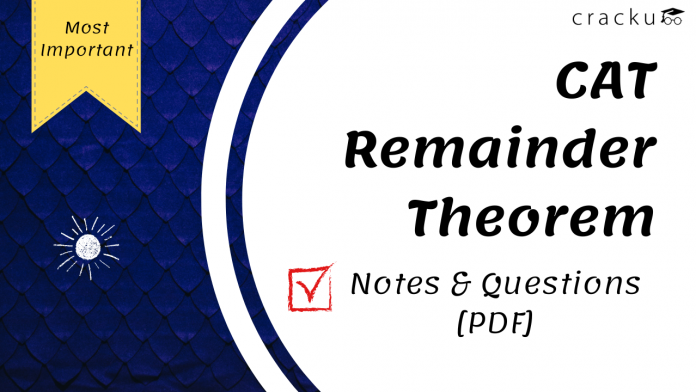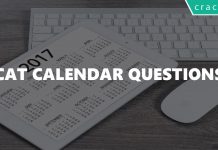The Remainder theorem is a part of the Number Systems topic in the CAT Quant Section. You can check out these CAT Remainder Questions from Previous years. In this article, we will look into some important CAT Remainder theorem Questions (with Notes) PDF. These are a good source for practice; If you want to practice these questions, you can download these CAT Remainder theorem Questions PDF below, which is completely Free.
Download Important Questions on Remainder Theorem
Enroll for CAT 2022 Online Course
- CAT Remainder theorem Questions – Tip 1: If you’re starting the prep, firstly understand the CAT Number System Syllabus; Based on our analysis of the previous years CAT number system questions, only a few questions were asked from CAT Remainder theorem questions.
- CAT Remainder theorem Questions – Tip 2: If you’re not very strong in this topic, don’t spend too much time on these theorems. Only after you have completed all other topics, you can go to CAT remainder theorem questions and concepts.
- You can practice these CAT remainder theorem questions in PDF with video solutions. Learn all the major formulae from these concepts and the Important Number System for CAT tricks Formulas PDF here.
Join our Telegram group of MBA aspirants for quick and regular exam updates; you can also post and discuss your queries with your peers and exam experts.
Question 1: A positive whole number M less than 100 is represented in base 2 notation, base 3 notation, and base 5 notation. It is found that in all three cases the last digit is 1, while in exactly two out of the three cases the leading digit is 1. Then M equals
a) 31
b) 63
c) 75
d) 91
1) Answer (D)
Solution:
Since in all three cases the last digit is 1, the number should give remainder 1 when divided individually by 2,3,5 . So the no. may be 31 or 91 . Now 31 in base 2,3 and 5 give first digit as 1 in all the 3 cases while 91 gives exactly two out of the three cases the leading digit as 1. Hence option D.
Question 2: The remainder, when $(15^{23} + 23^{23})$ is divided by 19, is
a) 4
b) 15
c) 0
d) 18
2) Answer (C)
Solution:
The remainder when $15^{23}$ is divided by 19 equals $(-4)^{23}$
The remainder when $23^{23}$ is divided by 19 equals $4^{23}$
So, the sum of the two equals$(-4)^{23}+(4)^{23}=0$
Question 3: If x = $(16^3 + 17^3+ 18^3+ 19^3 )$, then x divided by 70 leaves a remainder of
a) 0
b) 1
c) 69
d) 35
3) Answer (A)
Solution:
We know that x = $16^3 + 17^3 + 18^3 + 19^3 = (16^3 + 19^3) + (17^3 + 18^3)$
= $(16 + 19)(16^2 – 16 * 19 + 19^2) + (17 + 18)(17^2 – 17 * 18 + 18^2)$ = 35 × odd + 35 × odd = 35 × even = 35 × (2k)
=> x = 70k
=> Remainder when divided by 70 is 0.
Question 4: Let $n!=1*2*3* …*n$ for integer $n \geq 1$.
If $p = 1!+(2*2!)+(3*3!)+… +(10*10!)$, then $p+2$ when divided by 11! leaves a remainder of
a) 10
b) 0
c) 7
d) 1
4) Answer (D)
Solution:
According to given condiiton we have p = (1 × 1!) + (2 × 2!) + (3 × 3!) + (4 × 4!) + … + (10 × 10!) . So n × n! = [(n + 1) – 1] × n! = (n + 1)! – n!. So equation becomes p = 2! – 1! + 3! – 2! + 4! – 3! + 5! – 4! +… + 11! – 10!. So p = 11! – 1! = 11! – 1. p + 2 = 11! + 1 .So when it is divided by 11! gives a remainder of 1. Hence, option 4.
Question 5: Let N = 1421 * 1423 * 1425. What is the remainder when N is divided by 12?
a) 0
b) 9
c) 3
d) 6
5) Answer (C)
Solution:
The numbers 1421, 1423 and 1425 when divided by 12 give remainder 5, 7 and 9 respectively.
5*7*9 mod 12 = 11 * 9 mod 12 = 99 mod 12 = 3
Question 6: The integers 34041 and 32506 when divided by a three-digit integer n leave the same remainder. What is n?
a) 289
b) 367
c) 453
d) 307
6) Answer (D)
Solution:
The difference of the numbers = 34041 – 32506 = 1535
The number that divides both these numbers must be a factor of 1535.
307 is the only 3 digit integer that divides 1535.
Question 7: Convert the number 1982 from base 10 to base 12. The result is:
a) 1182
b) 1912
c) 1192
d) 1292
7) Answer (C)
Solution:
Quotient of 1982/12 = 165, remainder = 2
Quotient of 165/12 = 13, remainder = 9
Quotient of 13/12 = 1, remainder = 1
Remainder of 1/12 = 1
So, the required number in base 12 = 1192
Question 8: When $2^{256}$ is divided by 17, the remainder would be
a) 1
b) 16
c) 14
d) None of these
8) Answer (A)
Solution:
$2^4 = 16 = -1$ (mod $17$)
So, $2^{256} = (-1)^{64} $(mod $17$)
$= 1$ (mod $17$)
Hence, the answer is 1. Option a).
Question 9: After the division of a number successively by 3, 4 and 7, the remainders obtained are 2, 1 and 4 respectively. What will be the remainder if 84 divides the same number?
a) 80
b) 75
c) 41
d) 53
9) Answer (D)
Solution:
Since after division of a number successively by 3, 4 and 7, the remainders obtained are 2, 1 and 4 respectively, the number is of form ((((4*4)+1)*3)+2)k = 53K
Let k = 1; the number becomes 53
If it is divided by 84, the remainder is 53.
Option d) is the correct answer.
Alternative Solution.
Consider only for 3 and 4 and the remainders are 2 and 1 respectively.
So 5 is the first number to satisfy both the conditions. The number will be of the form 12k+5. Put different integral values of k to find whether it will leave remainder 5 when divided by 7. So the first number to satisfy such condition is 48×4+5= 53
Question 10: The remainder when $2^{60}$ is divided by 5 equals
a) 0
b) 1
c) 2
d) None of these
10) Answer (B)
Solution:
$2^{60}$ or $4^{30}$ when divided by 5
So according to remainder theorem
remainder will be $(-1)^{30}$ = 1.
Question 11: Find the minimum integral value of n such that the division $\frac{55n}{124}$ leaves no remainder.
a) 124
b) 123
c) 31
d) 62
11) Answer (A)
Solution:
As 55 and 124 don’t have any common factor, and n has to be a minimum integer, Hence, it should be 124 only. So that given equation won’t have a remainder.
Question 12: A certain number, when divided by 899, leaves a remainder 63. Find the remainder when the same number is divided by 29.
a) 5
b) 4
c) 1
d) Cannot be determined
12) Answer (A)
Solution:
Let’s say N is our number
N = (899K + 63) or N = ($29 \times 31$K) + 63
So when it is divided by 29, remainder will be $\frac{63}{29}$ = 5
Question 13: A is the set of positive integers such that when divided by 2, 3, 4, 5, 6 leaves the remainders 1, 2, 3, 4, 5 respectively. How many integers between 0 and 100 belong to set A?
a) 0
b) 1
c) 2
d) None of these
13) Answer (B)
Solution:
Let the number ‘n’ belong to the set A.
Hence, the remainder when n is divided by 2 is 1
The remainder when n is divided by 3 is 2
The remainder when n is divided by 4 is 3
The remainder when n is divided by 5 is 4 and
The remainder when n is divided by 6 is 5
So, when (n+1) is divisible by 2,3,4,5 and 6.
Hence, (n+1) is of the form 60k for some natural number k.
And n is of the form 60k-1
Between numbers 0 and 100, only 59 is of the form above and hence the correct answer is 1
Question 14: A number is formed by writing first 54 natural numbers next to each other as 12345678910111213 … Find the remainder when this number is divided by 8.
a) 1
b) 7
c) 2
d) 0
14) Answer (C)
Solution:
For a number to be divisible by 8, last 3 digits must be divisible by 8.
Last 3 digits of this number are 354.
354 mod 8 = 2
Hence, 2 is the remainder.
Question 15: The remainder when $7^{84}$ is divided by $342$ is :
a) 0
b) 1
c) 49
d) 341
15) Answer (B)
Solution:
$7^3$ = 343
$7^{84}$ = $(7^3)^{28}$ = $343^{28}$
$343^{28}$ mod 342 = $1^{28}$ mod 342 = 1
Download Free MBA Preparation App




![CAT Averages Questions PDF [Important Questions] CAT AVERAGES Questions PDF](https://cracku.in/blog/wp-content/uploads/2022/07/CAT-AVERAGES-Questions-PDF-218x150.png)
